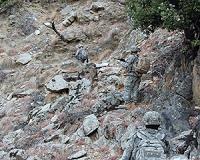 |
Washington (AFP) April 27, 2011 Seasoned diplomat Ryan Crocker will have to draw on a wealth of experience honed in the world's hotspots if, as expected, he becomes the US ambassador to Kabul at a time of frosty ties. After a decade of war against Taliban militants and before US troops begin to withdraw from Afghanistan, President Hamid Karzai has been an unrelenting, irascible critic of the United States and the NATO-led mission in his country. Relations with the current US ambassador, Karl Eikenberry, have sunk to new lows, reflecting the lack of trust placed by the US administration in Karzai, re-elected to a new presidential term in fraud-tainted elections in 2009. A US official, speaking on condition of anonymity, confirmed to AFP Wednesday that Crocker, currently dean of the George Bush School of Government and Public Service at Texas A&M university, will be nominated to replace Eikenberry in Kabul. It is expected to be officially unveiled this week as part of a major shakeup of US President Barack Obama's national security team that would also see CIA director Leon Panetta take over as the new defense secretary from Robert Gates this summer, a US official told AFP. As part of the overhaul, Obama also is expected to name General David Petraeus, the top US and NATO commander in Afghanistan, to succeed Panetta at the helm of the Central Intelligence Agency, US media reported. Crocker, 61, knows Afghanistan well, having been among the team that re-opened the US embassy in Kabul in 2001 after the Taliban were ousted by the US-led operation. But he will still walk a delicate tightrope trying to keep ties between Kabul and Washington on an even keel as US and international forces prepare to hand over security in the war-torn nation to Afghan forces by 2014. He will also have to coordinate the transition of Washington's mission as it moves from being a military partner with Kabul to providing civilian aid, something which promises to be a difficult task. Crocker, a fluent Arabic speaker has served as ambassador to Syria, Lebanon and Kuwait as well as to Pakistan, and more recently was the US envoy to Iraq, helping to forge a semblance of peace among its warring groups. He has also taken posts in Iran, Qatar and Egypt. "Unlike in Iraq, Crocker will go to Kabul when diplomatic relations between the United States and Afghanistan are at an all-time low," The Atlantic review wrote. "There is probably no diplomat better equipped for those difficult missions than Crocker, a man Petraeus used to fondly describe as his 'diplomatic wingman,'" the review added. Crocker is married to a diplomat and is the son of an Air Force officer. A marathon runner, who is known for being a workaholic, he had retired in 2009 after a 37-year career and covered in honors, awarded the Presidential Medal of Freedom by then US leader George W. Bush. Bush called Crocker "America's Lawrence of Arabia" as he decorated him. A small, wiry, white-haired man who jogs every morning, Crocker is a workaholic known for driving his staff hard, but for also being methodical, thoughtful, and at times even morose. Crocker is also well accustomed to dangerous postings. He survived the 1983 bombing of the US embassy in Beirut which killed 63 people, including 17 Americans. That attack was followed by another near miss six months later when the multinational forces' barracks in the Lebanese capital were blown up, killing 241 US servicemen and 58 French paratroopers. Crocker led the Iraq-Kuwait task force during the first Iraq war in 1991 and came back to Baghdad for four months in the wake of the 2003 invasion to help set up the US occupation administration that replaced the ousted regime of Saddam Hussein. "Few diplomats have the kind of experience in the broader Middle East that Ryan has amassed," said former US secretary of state Condoleezza Rice when she announced Crocker's nomination to be the ambassador in Iraq in 2007. Crocker is well aware of the difficulty of his mission. "Relentless internal conflict is not endemic in Iraq. In Afghanistan it is," he wrote in Newsweek in 2009. "For most Afghans an effective central government isn't even a distant memory. Tribal identity is everything." And he said Al-Qaeda and the Taliban have learned from insurgencies in Iraq. "They have not forced the people to turn against them. They know the hills and valleys of the political terrain as well as they do the killing fields of Helmand province or the caves of Tora Bora. They have learned strategic patience."
Share This Article With Planet Earth
Related Links News From Across The Stans
 Afghan pullout to be slow process, warns US general
Afghan pullout to be slow process, warns US generalWashington (AFP) April 27, 2011 A top US officer returning from commanding US Marines in Afghanistan's restive southwest emphasized Wednesday that the pullout of foreign troops from the country would be a slow, drawn-out process. The withdrawal will be "a slow transition, not a lot of bells and whistles, not a lot of parades, because we don't want to attract attention," stressed Major General Richard Mills in remarks to re ... read more |
|
| The content herein, unless otherwise known to be public domain, are Copyright 1995-2010 - SpaceDaily. AFP and UPI Wire Stories are copyright Agence France-Presse and United Press International. ESA Portal Reports are copyright European Space Agency. All NASA sourced material is public domain. Additional copyrights may apply in whole or part to other bona fide parties. Advertising does not imply endorsement,agreement or approval of any opinions, statements or information provided by SpaceDaily on any Web page published or hosted by SpaceDaily. Privacy Statement |